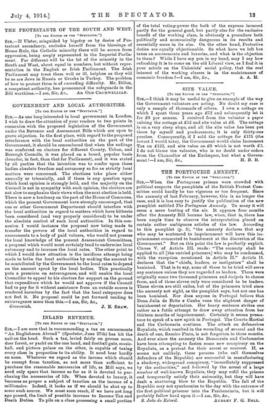THE PORTUGUESE AMNESTY.
[To THR EDITOR OF TEX -spxcv.Tos."] Sin,—When the Portuguese prisons were crowded with political suspects the pamphlets of the British Protest Com- mittee could hardly be too vigorous or too frequent. Since the amnesty of last February, however, this is no longer the case, and it is less easy to justify the publication of the new pamphlet entitled The Portuguese Amnesty. To many it will seem a mere beating of the air. It appears four months after the Amnesty Bill became law, when, that is, there has been ample time to observe the interpretation placed on certain rather ambiguous articles of the law. According to this pamphlet (p. 5), "the amnesty declares that any who may be sentenced to imprisonment will have this im- prisonment commuted to banishment at the discretion of the Government." But on this point the law is perfectly explicit. Clause V. of Article III. reads : "The amnesty shall be applied to all [the untried prisoners] who may he condemned, with the exception mentioned in Article II." Article IL declares that the "chiefs, leaders, or instigators" shall be banished. That is to say, none of those to be tried will serve any sentence unless they are regarded as leaders. There were originally some two thousand prisoners and imigris to choose from, and of these eleven only were considered to be leaders. These eleven are still exiles, but of the prisoners tried since the amnesty not eight, as the pamphlet says, but not one has been banished. Nor does anyone in Portugal believe that Dona Julia de Brit* e Cunha runs the slightest danger of banishment or deportation. Her heavy sentence strikes one rather as a futile attempt to draw away attention from her thirteen months of imprisonment. Certainly it seems prema- ture to speak of a new spirit in Portugal. The Courts-Martial and the Carbonaria continue. The attack on defenceless Royalists, which resulted in the wounding of several and the death of one, Ramiro Pinto, is not forgotten in three months. And ever since the amnesty the Democrats and Carbonarios have been attempting to fasten some new conspiracy on the Royalists, as a pretext for their arrest or rearrest. If, as seems not unlikely, these persons (who call themselves defenders of the Republic) are successful in manufacturing a shadowy, widespread conspiracy, "immediately suppressed by the authorities," and followed by the arrest of a large number of well-known Royalists, they may refill the prisons and temporarily satisfy their animosity, but they will have dealt a shattering blow to the Republic. The fall of the Republic may not synchronize to the day with the entrance of the first political prisoner into the Penitenciaria, but it will probably follow hard upon it.—I am, Sir, &a.,


















































 Previous page
Previous page